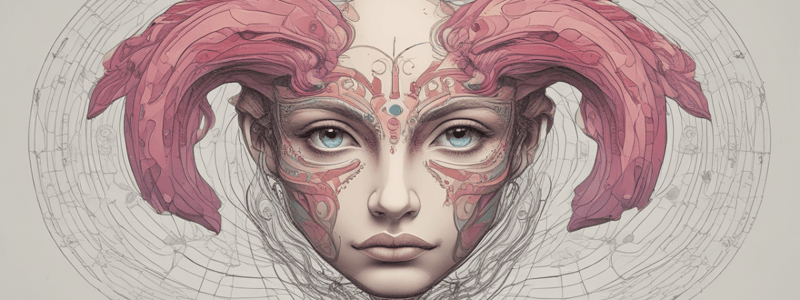Podcast
Questions and Answers
What was the era in which Sigmund Freud lived?
What was the era in which Sigmund Freud lived?
- Modern era
- Industrial era
- Victorian era (correct)
- Renaissance era
What was Sigmund Freud's personal background in?
What was Sigmund Freud's personal background in?
- Neuroscience (correct)
- Biology
- Philosophy
- Psychology
What is the primary focus of Lecture 1 in the lecture series?
What is the primary focus of Lecture 1 in the lecture series?
- Humanistic approaches
- Introduction to personality (correct)
- Cognitive approaches
- Psychoanalytic approaches
Who is associated with the concept of archetypes and complexes?
Who is associated with the concept of archetypes and complexes?
What was Sigmund Freud's study area related to?
What was Sigmund Freud's study area related to?
What is the primary focus of Lecture 2 in the lecture series?
What is the primary focus of Lecture 2 in the lecture series?
What is the title of the lecture that discusses personality assessment?
What is the title of the lecture that discusses personality assessment?
How old was Sigmund Freud when he died?
How old was Sigmund Freud when he died?
What is the term for a failure to move forward from one stage to another in psychosexual development?
What is the term for a failure to move forward from one stage to another in psychosexual development?
According to Freud, what is the purpose of psychoanalysis?
According to Freud, what is the purpose of psychoanalysis?
What is the term for the concept that everything that happens in a person's psyche has a specific cause?
What is the term for the concept that everything that happens in a person's psyche has a specific cause?
What is the level of awareness that is associated with everyday life and conscious thought?
What is the level of awareness that is associated with everyday life and conscious thought?
What is the term for the part of the mind that contains memories and emotions that have not been repressed?
What is the term for the part of the mind that contains memories and emotions that have not been repressed?
What is the term for the psychological result of mainly the brain's and partly the rest of the body's physiological functions?
What is the term for the psychological result of mainly the brain's and partly the rest of the body's physiological functions?
What is the model that divides the mind into levels of awareness?
What is the model that divides the mind into levels of awareness?
What is the level of awareness that operates under its own rules and contains a significant portion of our mental life?
What is the level of awareness that operates under its own rules and contains a significant portion of our mental life?
What is the purpose of word association tasks in identifying complexes?
What is the purpose of word association tasks in identifying complexes?
What is a key feature of Jung's personality theories?
What is a key feature of Jung's personality theories?
What is a limitation of Jung's theories, according to critics?
What is a limitation of Jung's theories, according to critics?
What is a therapeutic technique developed by Jung?
What is a therapeutic technique developed by Jung?
What is the name of the psychologist who influenced Jung's work on word association tasks?
What is the name of the psychologist who influenced Jung's work on word association tasks?
What is measured in word association tasks to assess psychological patterns?
What is measured in word association tasks to assess psychological patterns?
What is a significant contribution of Jung's theories to the field of psychiatry?
What is a significant contribution of Jung's theories to the field of psychiatry?
What is a type of therapy developed by Jung to treat anxiety and mood disorders?
What is a type of therapy developed by Jung to treat anxiety and mood disorders?
What is the main function of the Ego according to the structural model?
What is the main function of the Ego according to the structural model?
What is the primary principle guiding the Id's behavior?
What is the primary principle guiding the Id's behavior?
What is the result of prolonged and unresolved conflict between the parts of the mind?
What is the result of prolonged and unresolved conflict between the parts of the mind?
What is the primary role of the Superego according to the structural model?
What is the primary role of the Superego according to the structural model?
What is the primary purpose of defense mechanisms?
What is the primary purpose of defense mechanisms?
What is the term for the friction between the different parts of the mind?
What is the term for the friction between the different parts of the mind?
Who is the Swiss psychiatrist and psychoanalyst associated with the structural model?
Who is the Swiss psychiatrist and psychoanalyst associated with the structural model?
What is the primary concern of the Ego regarding the Superego?
What is the primary concern of the Ego regarding the Superego?
What was the primary focus of Galton's word association tasks?
What was the primary focus of Galton's word association tasks?
What was the outcome of Jung's mentoring by Freud?
What was the outcome of Jung's mentoring by Freud?
What is the primary source of Freud's observations in 1905?
What is the primary source of Freud's observations in 1905?
What is the collective unconscious, according to Jung?
What is the collective unconscious, according to Jung?
What is the role of archetypes in the collective unconscious?
What is the role of archetypes in the collective unconscious?
What is the relationship between the collective unconscious and complexes?
What is the relationship between the collective unconscious and complexes?
What is the basis of the collective unconscious, according to Jung's physiological perspective?
What is the basis of the collective unconscious, according to Jung's physiological perspective?
What is the function of archetypes in determining human behavior and experience?
What is the function of archetypes in determining human behavior and experience?
Flashcards are hidden until you start studying
Study Notes
Psychoanalytic and Psychodynamic Approaches
- Sigmund Freud (1856-1939) was an Austrian neurologist who lived in the Victorian era, a time of sexual conservatism and initial attempts to explain psychology in biological terms.
- Freud's background was in neuroscience, and he studied hypnotherapy.
- He developed the concept of psychoanalytic theory, which emphasizes the role of unconscious processes in shaping behavior and personality.
The Structure of Personality
- Freud's topographic model proposes three levels of awareness:
- Conscious: tip of the iceberg, objects perceived, events recalled, and stream of thought.
- Preconscious: associated with a part of the mind below immediate conscious awareness, from which memories and emotions can be recalled.
- Unconscious: the hidden, secret realm of our mental world, containing a significant portion of our mental life, operating under its own rules.
The Structural Model
- The mind consists of three functionally independent, and sometimes conflicting, parts:
- Id (aka it or that): the irrational and emotional part of the mind, driven by the pleasure principle.
- Ego (aka I): the rational and decision-making part of the mind, governed by the reality principle.
- Superego (aka Over-I): the moral part of the mind.
Psychic Conflict
- The friction between the different parts of the mind can lead to anxiety, guilt, and mental illness.
- The ego's main job is to find a middle course between the competing demands of motivation, morality, and practicality.
- Mechanisms to cope with psychic conflict include defense mechanisms, which are largely unconscious reactions that protect a person from feelings of anxiety and guilt.
Jung in Context
- Carl Jung (1875-1961) was a Swiss psychiatrist and psychoanalyst who developed the concept of the collective unconscious.
- Jung was mentored by Freud, but they eventually had a falling out.
- Jung's work focused on more extreme experiences, including patients with psychotic breakdowns.
Jung's Structural Model
- Archetypes emerge from the collective unconscious into the personal unconscious, where they form complexes that drive behavior and experience.
- Complexes are blends of archetypal patterns and material in the personal unconscious.
The Collective Unconscious
- The collective unconscious is made up of archetypes, which are ancient, qualitative patterns of being that evolved to deal with existence.
- Archetypes are described in myths and symbols and aid recall and understanding.
- Examples of archetypes include:
- Mother
- Hero
- Trickster
- Child
Complexes
- Complexes are identified using word association tasks, which were developed by Jung.
- Complexes are latent, unconscious psychological patterns that can be revealed through word association tasks.
- 11 patterns of complexes were identified by Jung.
Contributions
- Psychoanalytic and psychodynamic theories were the first to propose the existence and influence of unconscious processes and forces.
- These theories focused on the effects of early development on adult personality.
- They contributed to the foundations of modern psychiatry and the treatment of anxiety and mood disorders.
Criticism
- Psychoanalytic and psychodynamic theories have been criticized for poor testability and scientific value.
- They have also been criticized for poor external validity.
Studying That Suits You
Use AI to generate personalized quizzes and flashcards to suit your learning preferences.




